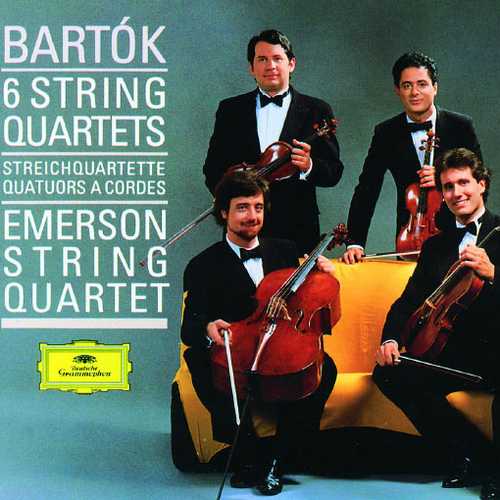
Composer: Béla Bartók
Performer: Emerson String Quartet
Format: FLAC (tracks)
Label: Deutsche Grammophon
Catalogue: 4236572
Release: 1998
Size: 647 MB
Recovery: +3%
Scan: cover
CD 01
String Quartet No. 1, Sz 40 (Op. 7)
01. 1. Lento
02. 2. Allegretto
03. 3. Introduzione. Allegro – Allegro vivace
String Quartet No. 3, Sz 85
04. 1. Prima parte (Moderato)
05. 2. Seconda parte. Allegro – attacca: Ricapitulazione della prima parte. Moderato
06. 3. Coda. Allegro molto
String Quartet No. 5, Sz 102
07. 1. Allegro
08. 2. Adagio molto
09. 3. Scherzo. Alla bulgarese
10. 4. Andante
11. 5. Finale. Allegro vivace
CD 02
String Quartet No. 2, Sz 67 (Op. 17)
01. 1. Moderato
02. 2. Allegro molto capriccioso
03. 3. Lento
String Quartet No. 4, Sz 91
04. 1. Allegro
05. 2. Prestissimo, con sordino
06 .3. Non troppo lento
07. 4. Allegretto pizzicato
08. 5. Allegro molto
String Quartet No. 6, Sz 114
09. 1. Mesto – Vivace
10. 2. Mesto – Marcia
11. 3. Mesto – Burletta (Moderato)
12. 4. Mesto
Among the top performers of Béla Bartók’s six string quartets, the Emerson String Quartet has had few rivals, and it is perhaps only matched in technical prowess and expressive clarity by the Takács String Quartet in its 1998 recordings on London, and historically, by the Juilliard String Quartet in its legendary 1963 cycle for Columbia. While the Takács may be more heated in its folk-like expressions and fiery rhythms, and the Juilliard more coolly classical in tone and execution, the Emerson takes a legitimate position between the two: there is room for some flexibility in Bartók, and to the extent that the Emerson gives a balanced presentation of the composer’s impulses and aesthetics, the interpretations are effective and feel authentic without ever falling into clichés.
The Emerson’s award-winning 1988 set presents the works three to a disc, with odd-numbered quartets on the first and even-numbered on the second, to fit easily on two CDs without the break that a sequential order causes. Deutsche Grammophon’s recording technology has been improved over the years since these recordings were made, but the sound is still terrific for late-’80s digital quality, though the slightly dry ambience may not be to everyone’s taste.